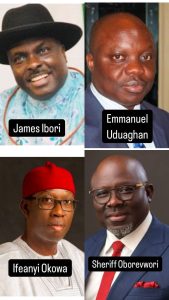
By Ewere Okonta
08037383019
www.ewereokontablog.org.ng
- Chief James Onanefe Ibori (1999–2007)
Title: The Architect of Delta’s Political Foundation
When Nigeria returned to democratic governance in 1999, Chief James Ibori emerged as the man of the moment in Delta State. A charismatic figure with deep grassroots appeal, Ibori wasn’t just the first democratically elected governor of the state under the PDP platform — he was the political architect who laid the foundation for the PDP’s 26-year dominance in Delta.
Ibori’s legacy is multifaceted. He invested heavily in infrastructure, initiating road construction projects that connected previously isolated communities. He established the Delta State University campuses in Anwai and Oleh, expanded the Oghara Teaching Hospital, and was the brain behind the Delta State Oil Producing Areas Development Commission (DESOPADEC)—a bold move to directly address the developmental needs of oil-producing communities.
Perhaps Ibori’s most lasting legacy lies in his talent for political engineering. He built a powerful political structure that produced not only his successors but also numerous lawmakers, commissioners, and federal appointees. Despite later controversies that marred his personal image, no one can deny that Ibori planted the PDP flag firmly in Delta — and it flew high for decades.
- Dr. Emmanuel Eweta Uduaghan (2007–2015)
Title: The Bridge Between Health, Peace, and Infrastructure
Dr. Emmanuel Uduaghan, a medical doctor and former Secretary to the State Government, took over from Ibori in 2007. His transition to power was smooth, but his leadership style was distinct — quieter, more technocratic, and deeply focused on peace-building and human capital development.
Uduaghan came into power during a time of growing militancy in the Niger Delta. His most celebrated achievement was his Delta Beyond Oil vision — a forward-thinking strategy to diversify the state’s economy beyond crude oil. He championed health sector reform, including the development of free maternal and child healthcare, revamped hospitals, and improved access to rural healthcare.
He also played a stabilizing role in the creeks, working behind the scenes to support the federal government’s Amnesty Program, helping bring ex-agitators back into society.
Uduaghan’s eight years may not have carried the glamour of monumental projects, but he preserved peace, expanded education, and deepened institutional governance. In many ways, he was the bridge that held PDP’s legacy firm while the political waters churned around him.
- Senator Dr. Ifeanyi Arthur Okowa (2015–2023)
Title: The Grassroots Strategist and National Voice
Dr. Ifeanyi Okowa brought a unique mix of political savvy and public health expertise to the table. From his days as Secretary to the Local Government in Ika North East to his tenure as Senator representing Delta North, Okowa was always a man of the grassroots. His 2015 emergence as governor marked the first time Delta North produced a governor since the state’s creation.
Okowa’s administration was largely driven by inclusion, empowerment, and development, anchored on the policy vision known as the SMART Agenda — which stood for Strategic Wealth Creation, Meaningful Peace Building, Agricultural Reforms, Relevant Health and Education Policies, and Transformed Environment.
He launched several pioneering initiatives, including:
- STEP (Skills Training and Entrepreneurship Programme)
- YAGEP (Youth Agricultural Entrepreneurs Programme)
These were designed to tackle youth unemployment and build a culture of self-reliance and entrepreneurship across the state.
Arguably, two of his signature legacies are in education and infrastructure.
In a historic move, Okowa created three new state universities — a feat that elevated Delta to one of the few states in Nigeria with four state-owned universities. The institutions include:
- University of Delta, Agbor (formerly College of Education, Agbor)
- Dennis Osadebay University, Asaba
- University of Science and Technology, Ozoro (upgraded from the Polytechnic)
This bold educational expansion significantly increased access to tertiary education for Deltans, especially in underserved areas.
On infrastructure, Okowa’s administration rolled out massive road construction and rehabilitation projects, especially in hard-to-reach riverine and rural areas. The Asaba storm drainage project, the Oleh-Isoko ring road, Kwale roads, and several internal roads in Warri, Ughelli, Agbor, and across the three senatorial districts speak volumes of his commitment to improving transportation and accessibility. He also commenced the upgrade of Asaba International Airport and completed several flyovers and interchanges to ease traffic congestion.
What set Okowa apart, however, was his rise to national prominence. In 2022, he was chosen as the Vice Presidential candidate of the PDP in the 2023 general elections — a bold leap that elevated Delta to the national spotlight.
Although PDP lost at the center, Okowa returned to the state as a political heavyweight. His ability to manage the complex diversity of Delta State — ethnically, economically, and politically — solidified his status as one of the most effective leaders of the PDP era.
And yet, in 2025, he stunned the nation by defecting to the APC alongside his successor, Rt. Hon. Sheriff Oborevwori. A move that has forever changed how his legacy will be viewed.
- Rt. Hon. Sheriff Francis Orohwedor Oborevwori (2023–2025)
Title: The Final Torchbearer and Unlikely Defector
When Rt. Hon. Sheriff Oborevwori emerged as the PDP’s candidate in 2023, many saw him as the perfect bridge between continuity and calm. As the longest-serving Speaker of the Delta State House of Assembly, he brought legislative experience, political loyalty, and street credibility to the table.
He campaigned on the mantra of “MORE” Agenda”—meaningful development, Opportunities for all, Realistic reforms, and enhanced peace and security. True to that, in his brief tenure, Oborevwori prioritized road projects, job creation, and the payment of pensions. He also began a quiet overhaul of some decaying public infrastructure.
But it was his defection on April 25, 2025, that forever altered his story.
In one dramatic swoop, he moved to the APC — not alone, but with the entire state executive council, all political appointees, all 25 local government chairmen and councillors, and perhaps most surprisingly, Senator Dr. Ifeanyi Okowa himself.
For many, Oborevwori was expected to hold the PDP line. Instead, he pulled the final plug.
His legacy, though still unfolding, may be remembered as the end of an era. Some see it as betrayal. Others view it as strategic realignment. But one thing is certain — Oborevwori will go down in history as the man who closed the PDP chapter in Delta politics.
Final Reflection:
From Ibori to Oborevwori, each PDP governor left a mark on Delta State — shaping its economy, institutions, and political culture. For 26 years, the PDP was more than just a party; it was the system.
That system has now crumbled.
Whether the APC era will match or exceed what came before remains to be seen. But the PDP era — with all its highs, lows, and unforgettable characters — will forever be a defining chapter in the story of Delta State.
Ewere Okonta is the CEO of EOB Media. He writes from the Department of Business Administration, University of Delta, Agbor.

